Sudipto Mandal, Vice President and CHRO – HR & Admin, Star Cement Ltd, in a conversation with India Employer Forum, on the biggest changes in the HR world in the past 2 years.
Q. Tell us a little about yourself.
I was born and brought up in Kolkata until 1996, when I moved out for my MBA in TISS, Mumbai. Since then, I have traveled around the country for work and have lived in all major metros. I love traveling and photography as a hobby, and I make sure I do both when on the move since they’re both interrelated.
Q. Do you think that the WFH model has led to a scenario where employees feel that they are on call 24/7 which might lead to higher burnout rates or do you think flexible work schedules and hybrid work arrangements can reduce stress of employees? How is your organization dealing with it?
Let’s go back a little. In the 80s, the only mode of communication was letters. There was not even email. The response time for this era of communication was slow and dependent on external factors. Today, in the digital age, we have access to our emails 24×7, which leads to us being on our toes all the time. So, yes there is a higher burnout rate when working at home and being available all the time, without any excuse of a weekend or vacation. But then there are people who encourage their employees to have a work-life balance, to not take calls after work hours.
One thing I have to agree with is that WFH has created a lot of flexibility. A lot of things like face-to-face interviews, recruitment processes, travel expenses for potential hires, has become easy right now, and employers are realizing its benefits. With young children and the elderly at home, remote working is a blessing in disguise. This model has opened up a lot of avenues to a lot of industries for hiring talent from any part of the world. But things are opening up and we need to gradually get the teams back to the office. In our manufacturing industry, when I look at my workforce, 2/3 of them are either working out on the production software or fighting it out on the street selling our products. So, there is no way production can happen online, and the need to be physically present in the office is there.
Q. With employees returning to the office what are the safety and health precautions that you are taking? What kind of approaches did you follow while framing the return to office policy? Is it done on a case-by-case as the people are experiencing this crisis differently, some are looking for childcare, some are caring for vulnerable people, some are not comfortable with social distancing requirements in the workplace, etc.
As I said that we do not have a choice, and that ⅔ of my employees need to come back to work, the only way to give them psychological safety and health safety is taking absolute precautions. In Star Cement, and in the cement industry, we are aware that human capital is the most important capital for us, and they have to put their feet on the ground and work. So, the kind of safety measures that we have taken in our factories, safety is the first priority. So, whatever you do, if you see that there is any chance of compromise, particularly in sales, when they are going and meeting the dealers, and if they find the dealer not taking the right precautions, they are very clearly told that they can walk out of that place, even if it means the production gets stalled. Also, we have been very proactively running campaigns and initiatives promoting social distance, masks and sanitizers at various checkpoints in the office and at our factories.
Q. What kind of partnerships/collaborations do you feel have to be established with specific educational institutions to ensure best in breed talent is recruited and a steady talent pipeline is sustained?
It starts with what kind of product you are selling, what kind of business are you into, and thereby what is your talent strategy? For example there are organizations where building talent has been made a priority. Tying up with educational institutes and collaborating with them by nurturing the students while they are studying, providing exposure into the industry, creating an industry academy interface, observing them and then training them into your organizations, imbibing them into your culture, is an age-old practice. However, when you are in a business where you are getting into a new area or diversifying into an unknown space, where you do not have internal capability, you have to depend on buying the talent from the market. So, you’d rather go and buy from similar industries and similar competencies immediately because you need results immediately. So, in our kind of manufacturing industry, engineering is the focus of hiring, whether it is a diploma or BE, these are some of the areas where you can always look at. Organizations do tie up with institutes and run a lot of initiatives and programs to attract the right talent and nurture them both within the institution and within the organization during the incubation period.
Q. What are the biggest challenges you have seen in the HR world in the last 2 years?
There are two aspects we are talking about, one is a general HR challenge of dealing with ambiguity and the second one is to be fair and transparent in this ambiguous situation. When you are not dealing with ambiguity then you can create a path and say that’s how I’d like to be fair and transparent with all the employees, but when there is an ambiguous situation, you need to have a different approach for different sets of employees. When we decided on the hybrid work model, we had to ensure that the senior folks are leading from the front, and coming back to the office, motivating the rest.
The lockdown was an issue the whole world was dealing with, so our only way to come out of that was to ensure personal and organizational safety and health. We were having lockdowns in different cities and different times and it was important to pay salaries in a manner that people felt they got a fair deal out of it. We also had to take care of various aspects of employee morale, employee equity, fairness and health, ensuring business is still running and it is profitable.
Watch the full interview: In Conversation with Sudipto Mandal, Vice President and CHRO – HR & Admin, Star Cement Ltd
About Sudipto Mandal
Mr. Sudipto Mandal is currently working as the VP and CHRO at Star Cement Limited. He has over 23 years of industry experience across different sectors ranging from Manufacturing, IT/ITES, FMCG, BFSI and Retail, in MNCs and leading Indian conglomerates.
He is an alumnus of TISS, Mumbai, and has worked with different organizations such as Asian Paints, Zeiss, Oracle, Spencer’s, CRISIL, Eveready. Mr. Mandal is also a certified “Coach” and certified trainer on Customer Service Management. He is a business leader whereas he intensely worked in areas like Business Strategy, HR Strategy & Cultural Transformation, Leadership Development, Change Management, Capability Building, Talent and Performance Management, Organization Design and Restructuring. As a techno-functional Oracle HRMS consultant, he has also worked in line function in Oracle Global Support team, supporting UK and EMEA regions. He has recently been appointed as the Honorary President of the Kolkata chapter of the NHRDN, the largest body and forum for HR in India.






